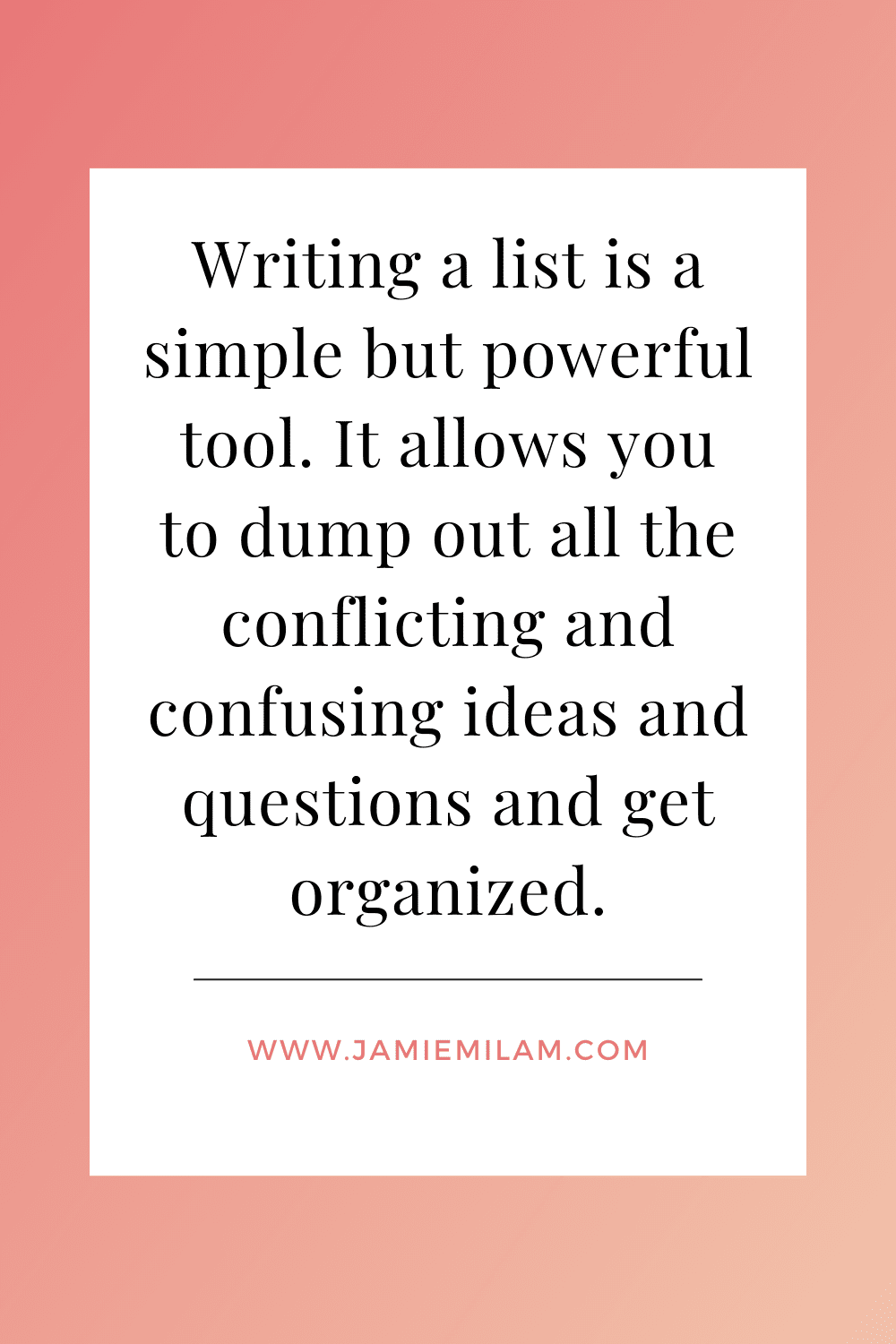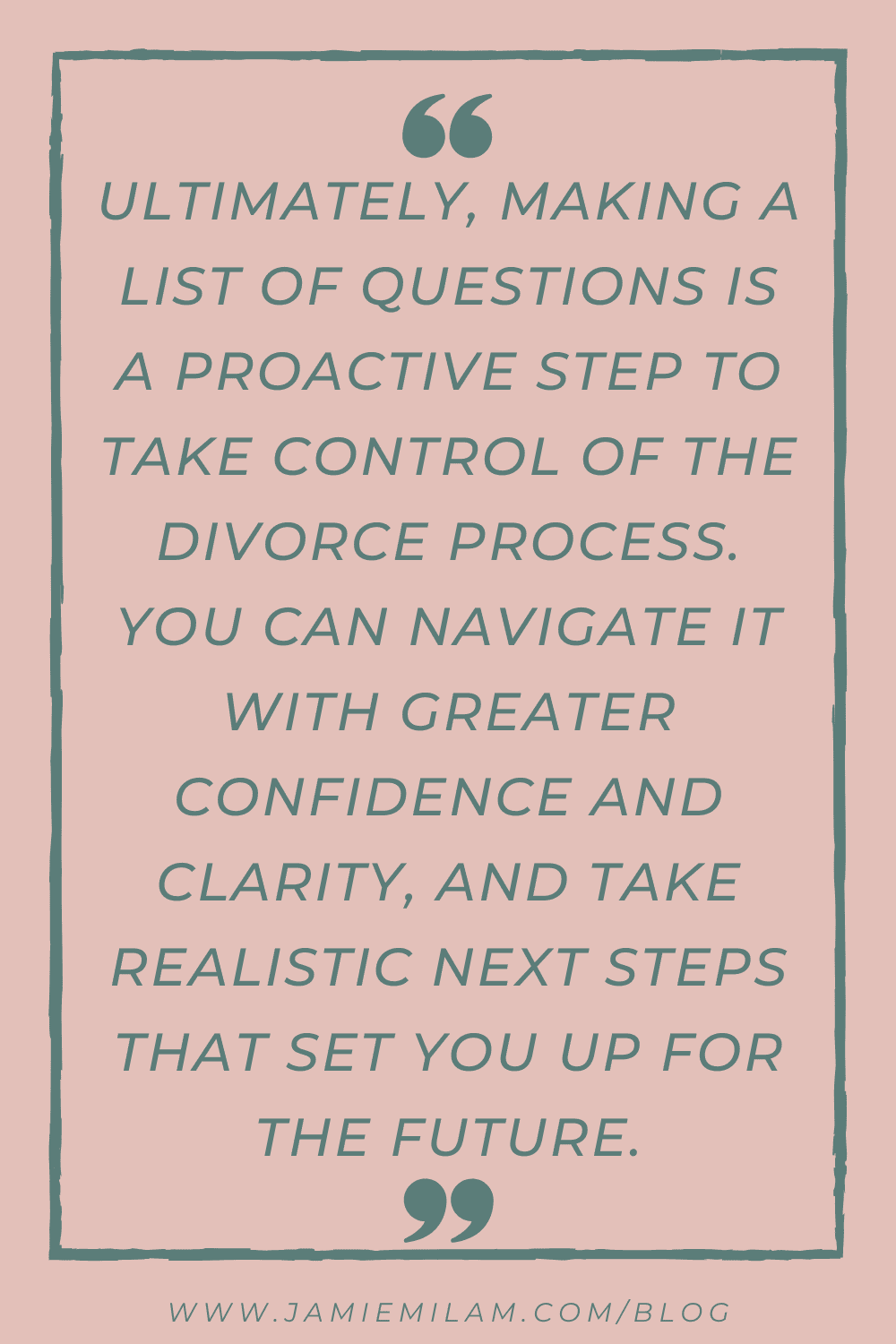THE BLOG
THE BLOG
*This website uses affiliate links which may earn a commission at no additional cost to you. As an Amazon addict and Associate, I earn from qualifying purchases, but I'm only recommending products I love!
Browse More Blog Posts:

Your First Thing To Do When Getting Divorced: Make a List
Between the emotional, legal, financial, and practical components, divorce is no simple process. You’re pulled a thousand ways during the process, left with another thousand questions about what to do with your house, how to manage finances, plans for the kids, and how to best tend to your own mental well-being.
And it can all be a little overwhelming. Even the most amicable divorce is sure to bring feelings of stress, worry, and anxiety.
And while there are many ways to mitigate these challenges, they all boil down to one simple starting point: making a list.
Whether you consider yourself a “list person” or not, there’s an undeniable power in getting all the thoughts, questions, and worries out onto a piece of paper to clarify your next steps.
Here we’ll look at what’s going on in your brain and why making a list of questions at the start of your divorce process is a necessary step.
Why You Need a List: The Amygdala Hijack
If you’re at the beginning of a divorce process—initiated by either you or your ex—or you’re still deciding if it’s the right decision, you’re likely feeling overwhelmed.
You might be finding it hard to know what the next right step is and you may be struggling to take any kind of action.
There’s a simple reason for this and it’s rooted in science. It’s called the amygdala hijack.
Your brain has an amygdala in each hemisphere of the brain, and it’s responsible for functions like defining and regulating emotions, and storing memories. It also activates the fight-or-flight response, signaling your brain to pump stress hormones that prepare you to fight for survival or flee to safety.
And unlike the ancient days when wild animals were a real threat, our fight-or-flight responses today are often triggered by emotions like stress, anxiety, aggression, fear, or anger.
Another part of your brain—the frontal lobes—are a bit more rational than your amygdala. They’re responsible for voluntary actions like reasoning, thinking, movement, decision-making, and planning. They allow you to evaluate your emotions and then use your experiences and judgement to respond. They’re not automatic like the ones generated by the amygdala.
So, what does this have to do with divorce and making lists?
Well, when your brain is perceiving a strong threat—like the intense emotions of relationship challenges and divorce—your amygdala may trigger a fight-or-flight response, pumping stress hormones throughout your body and leading to overwhelm.
And in that overwhelm, your brain is over-taxed and struggles to process information and make decisions. You may experience a reduced ability to think critically or weigh different options. You might have full-blown analysis paralysis, too unsure to take any steps forward.
But here’s the good news: mindfulness is one of the best antidotes to an amygdala hijack. It’s a super effective way to reduce overwhelm. It's a powerful practice that will carry you through the ups and downs of any situation that life brings you. It fosters awareness so that you can make thoughtful decisions and take aligned action.

And, while we can practice mindfulness a ton of different ways, there’s one simple and practical exercise anyone can benefit from to help you move forward. Yep, you guessed it—making a list.
Creating a list of questions when facing divorce helps you:
- Organize chaotic thoughts and ideas by getting them out of your head.
- Identify your fears and concerns through the questions that surface.
- Approach your next steps with more clarity.
- Reduce the “threat signals” to calm your amygdala and engage your frontal lobes.
- Alleviate the mental burden of trying to remember everything.
- Gather and organize information.
- Resolve questions one at a time, instead of trying to do it all at once.
- Seek help from other professionals in an organized manner.
Your list needs to be kept in a safe and secure place—for your eyes only. There are some things you’ll share with your ex or other people you’re working with but, for now, keep things private so you can take full advantage of brain-dumping all your questions.
Creating Your List of Questions During Divorce: 35 Ideas to Start With
Writing a list is a simple but powerful tool. It allows you to dump out all the conflicting and confusing ideas and questions and get organized. This is a non-exhaustive list, but serves as a starting point for you. It’s broken down by categories to help further organize your thoughts and ideas.
Ready? Here are 35 questions to start off your list:
Children
If you're a mom, your children are on your mind all the time. And when it comes to divorce, they're often your top priority! Here's what to start thinking about in relation to your kids:
- What are my rights in regard to custody?
- How is child support calculated?
- How will we manage co-parenting?
- How are visitation schedules arranged?
- Who is responsible for educational and medical expenses?
- How will our children be effected?
- How can we create an effective parenting plan?
For help with these questions, you may want to consult professionals like a family law attorney specializing in custody matters, mediator, parenting coordinator, financial advisor, or child counselor.
Division of assets
Money, money, money—it's always a point of stress, isn't it? Dividing up your financial, real estate, and other assets is a key part of divorce. Here are some questions to begin thinking about:
- Where will we live?
- Who will move out?
- What happens to the house?
- How will our assets and property be divided?
- What do we do with join accounts and debts?
- What's mine or theirs?
- What happens to a jointly-owned business during divorce?
For help with these questions, you may want to consult professionals like a divorce attorney, a REALTOR® who is a Certified Divorce Specialist®, a Certified Divorce Lending Professional®, a Certified Divorce Financial Analyst®, or a business valuation expert.
Financial survival
You need to be looking out for you. How will you financially survive a divorce? This is very important to consider before filing for divorce so you can set yourself and your children up as best as possible. Here are some questions to think about:
- Am I entitled to spousal support?
- How is the amount determined?
- What happens to my health insurance coverage after divorce?
- Can I afford an attorney?
- Will my employment situation need to change?
- What does my future budget need to look like?
For help with these questions, you may want to consult professionals and services like a divorce attorney, a Certified Divorce Coach®, a Certified Divorce Financial Analyst®, or a financial planner.
Safety

This doesn't apply to all situations, but some people experiencing divorce need to think about the physical safety of themselves and their children. Here's a few things to think about:
- What legal protections are available if there is domestic violence?
- How can I keep my children safe?
- Will I be accused of kidnapping?
For help with these questions, you may want to consult professionals like a domestic violence advocate or family law attorney.
Emotional support
While divorce is officially a legal process, it's an intensely emotional one. It's important to expect all kinds of emotions to surface through the process and think about how you'll manage them when they come up. Here's a few things to consider:
- How will I cope with the emotional challenges?
- Who do I wholeheartedly trust?
- What type of support groups are available?
- What reliable accounts can I follow or resources to use?
- What therapists take my insurance?
For help with these questions, you may want to consult professionals like a therapist, counselor, or divorce support groups. You can also find online communities and resources, such as Divorced and Determined AF—the podcast or on Instagram.

Divorce options
This is all about the nitty-gritty details of a divorce, the legalities of how it all plays out. Here are some questions to look into:
- What are my legal rights?
- What documents do I need to gather in the divorce process?
- What type of lawyer do I need?
- Should we consider mediation or litigation for our divorce process?
- What about collaborative law?
- How much are consultation fees?
- What affordable options are available to help me prepare?
For help with these questions, you may want to consult professionals like a Certified Divorce Coach® or attorney. You can also access resources that provide guidance on your next steps, such as the P.E.A.C.E. of Mind Initiative.
Ultimately, making a list of questions is a proactive step to take control of the divorce process. You can navigate it with greater confidence and clarity, and take realistic next steps that set you up for the future.
As you consult with the appropriate professionals on these questions, you'll receive valuable guidance and support tailored to your specific situation. If you are looking for vetted professionals to work with, visit the P.E.A.C.E. of Mind Initiative, where we have a database of people who are ready to help you.
Divorce is tough, and you're experiencing a lot of conflicting emotions and thoughts. To start making sense of it all, make your list of questions. Empower yourself with knowledge. And, work on making the next chapter of life the best one.
To making your list,

Save this post to come back to or share with a friend!

About Me
I'm Jamie Milam, a determined AF woman who's embraced life after divorce by finding peace through self-awareness, intentional decision-making, and thrilling new travel adventures.
As a Realtor® in Charlotte, NC (and your connection to top agents nationwide), I’m passionate about guiding you through your homeownership and design goals—while also helping you create space for the things you love. My mission is to empower you to create a life of alignment too - at home, abroad, and within.
Whether it’s through real estate tips, home design inspiration, or solo travel experiences for divorced, independent women, I hope this space encourages you to discover deeper self-awareness and build a life that aligns with your passions and needs.
Have you scoped the podcast series that empowers women to make aligned decisions in a divorce?

Your Free Charlotte City Guide

Jamie Milam is a Realtor® in the Charlotte, NC area, licensed in both NC & SC, and has the ability to refer you to a number of agent partners across the nation, regardless of where you may live. She is an enthusiast for the power of awareness and believes it can be used in all facets of life to support aligned living.
**Disclosure** This post may contain affiliate links and they are at no additional cost to you, though I may earn a small commission. Don't worry, I only recommend products or services that I have tried or believe would be of great value to you! All opinions expressed are those of my own!
Recent Posts
There's More ▾
There's More ▾
Let me share the goods!
Come from contribution, that's a motto I've valued for years! So... that's exactly what I am to provide you, straight into your inbox each week! No fluff and all open-book. Inspiring you to practice awareness, value your authentic self, and implement strategic actions so you can create alignment in your world to live the life you desire and deserve!

2 Comments
-
Thank you for sharing your personal experiences and stories It takes courage to open up and you do it with such grace and authenticity
-
This blog is such a hidden gem I stumbled upon it by chance and now I’m completely hooked!









Hello to all, because I am actually keen of reading this web site's post to be updated regularly. It contains fastidious information. https://ital-parts.com.ua/gde-kupit-nadezhnyy-shoker-dlya-samooborony-luchshie-magaziny-shokeru-com-ua https://tehnoprice.in.ua/shokery-protiv-napadayushchikh-kak-zashchitit-sebya-v-opasnoy-situatsii
Сайт Киева https://infosite.kyiv.ua ИнфоКиев: последние новости и события Киева и области.
Файне місто Львів https://faine-misto.lviv.ua сайт Львова. Новости, события, места и обзоры.
Новини Житомира https://faine-misto.zt.ua последние события Житомира и области
Новини Житомир https://u-misti.zhitomir.ua события и новости Житомира и области.
Новости Киева https://u-misti.kyiv.ua события, обзоры, произшествия
This blog is such a hidden gem I stumbled upon it by chance and now I'm completely hooked!
Thank you for sharing your personal experiences and stories It takes courage to open up and you do it with such grace and authenticity